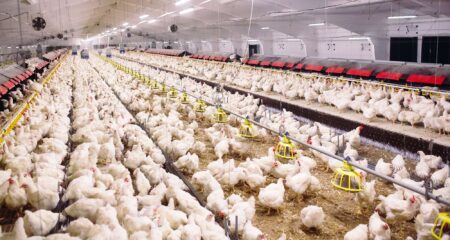Key Takeaways
- Farmers enjoyed 6.2 days suitable for fieldwork last week; Labor Day weekend looks cool and dry.
- Crop condition ratings are slightly worse than the national average, with disease pressures like tar spot spreading.
- Soybean progress is on track with average, but overall crop ratings are a bit weaker than the national average.
USDA published the latest Crop Progress report on Monday, Aug. 25. Here’s a closer look at recent weather and the status of Indiana’s most important crops in late-August.
Weather
Chief meteorologist Ryan Martin with Hoosier Ag Today said in an Aug. 28 podcast episode that Labor Day weekend should see cold air coming in with decent sunshine and no precipitation threats.
Into next week, he predicted warmer air coming up from the South and Southwest that will bring a front with 80% coverage across the state with a tenth to three-quarters of an inch of precipitation. After that, he forecast slightly cooler temperatures and dry weather.
In Monday’s Crop Progress report, USDA said farmers had 6.2 days suitable for fieldwork the week that ended Aug. 24, compared to 6.7 days this time last year.
USDA rated Indiana topsoil moisture 11% very short, 35% short, 51% adequate, and 3% surplus. Subsoil moisture conditions in the state were rated 14% very short, 32% short, 52% adequate, and 2% surplus.
Corn
Acreage Estimates
According to the June 30 Acreage report, Indiana farmers planted 5.4 million acres of corn in 2025. This is up from 5.2 million acres the previous year.
Pest and Disease Pressure
Darcy Telenko, Purdue University associate professor of botany and plant pathology, said in an Aug.22 article that a number of foliar diseases have arrived across Indiana.
“In our research site up in Porter County, we found four of the major foliar diseases northern corn leaf blight, tar spot, southern rust, and gray leaf spot,” Telenko reported.
A map published by the Crop Protection Network shows 35 counties reported positive tar spot cases so far.
Crop Protection Network
Telenko said due to environmental conditions, tar spot may not move rapidly into the upper canopy, but suspects that will change in the new couple of weeks.
Corn Dough
The latest Crop Progress report said 82% of Indiana’s corn crop has reached the dough stage. That is on track with the five-year average of 83%. Last year at this time 82% of the state’s corn had reached the dough stage.
Corn Dented
USDA said 34% of Indiana’s corn crop has reached the dent stage, equal to the five-year average. Last year at this time 40% of the state’s corn had reached the dent stage.
Corn Mature
The latest Crop Progress report said 1% of Indiana’s corn crop has reached maturity. The five-year average is 2%. Last year at this time 3% of the state’s corn had reached maturity.
Natalina Sents Bausch
Corn Condition
USDA rated Indiana corn 3% very poor, 8% poor, 26% fair, 52% good, and 11% excellent for the week that ended Aug. 24.
That is worse than the 18-state average rating reported by USDA as 2% very poor, 6% poor, 21% fair, 51% good, and 20% excellent.
Soybeans
Acreage Estimates
The Acreage report published June 30 said Indiana planted 5.5 million acres of soybeans this year. That is down from 5.8 million acres in 2024.
Pest and Disease Pressure
Telenko, in a different article, said she has seen some Septoria brown spot in soybeans.
She suggested considering these five factors regarding applying fungicide:
- Field history/previous crop
- Amount of disease present in the field
- Hybrid/variety susceptibility to diseases
- Weather conditions and disease risk models
- Value between crop and cost of fungicide application
Soybeans Setting Pods
The latest Crop Progress report said 89% of Indiana soybeans are setting pods. That is on track with the five-year average of 88%, and it was at 89% this time last year.
Soybeans Dropping Leaves
USDA reported 2% of Indiana soybeans are dropping leaves. That is similar to the five-year average of 3%. Last year at this time 6% of the state’s crop was dropping leaves.
Soybean Condition
USDA rated Indiana soybeans 3% very poor, 7% poor, 27% fair, 53% good, and 10% excellent for the week that ended Aug. 24.
Natalina Sents Bausch
The 18-state average ratings are 2% very poor, 6% poor, 23% fair, 54% good, and 15% excellent over the same time period.
Winter Wheat
Acreage Estimates
The USDA Acreage Report said Indiana farmers planted 320,000 acres of winter wheat, up from 310,000 acres from 2024.
All has been harvested in the week ending Aug. 24, according to USDA.
Pasture and Range
USDA rated pasture and range conditions in the state 4% very poor, 11% poor, 34% fair, 44% good, and 7% excellent.
The 48-state average is 11% very poor, 21% poor, 31% fair, 28% good, and 9% excellent.


:max_bytes(150000):strip_icc()/SuccessfulFarmingShareImage-8fed6410b43147a19ed5ea1e3243227f.png)

:max_bytes(150000):strip_icc()/IMG_7575-ac6db3006a2145109bcc2df421c7a962.jpeg)


:max_bytes(150000):strip_icc()/Poor-Corn-Ear-August-2025-e918bbef6cb44e0ab222ec1747eedcdd.jpg)


:max_bytes(150000):strip_icc()/Markets-3-Corn-up-3-19bdbeee0041452db8bce0a0f1c8b883.jpeg)
